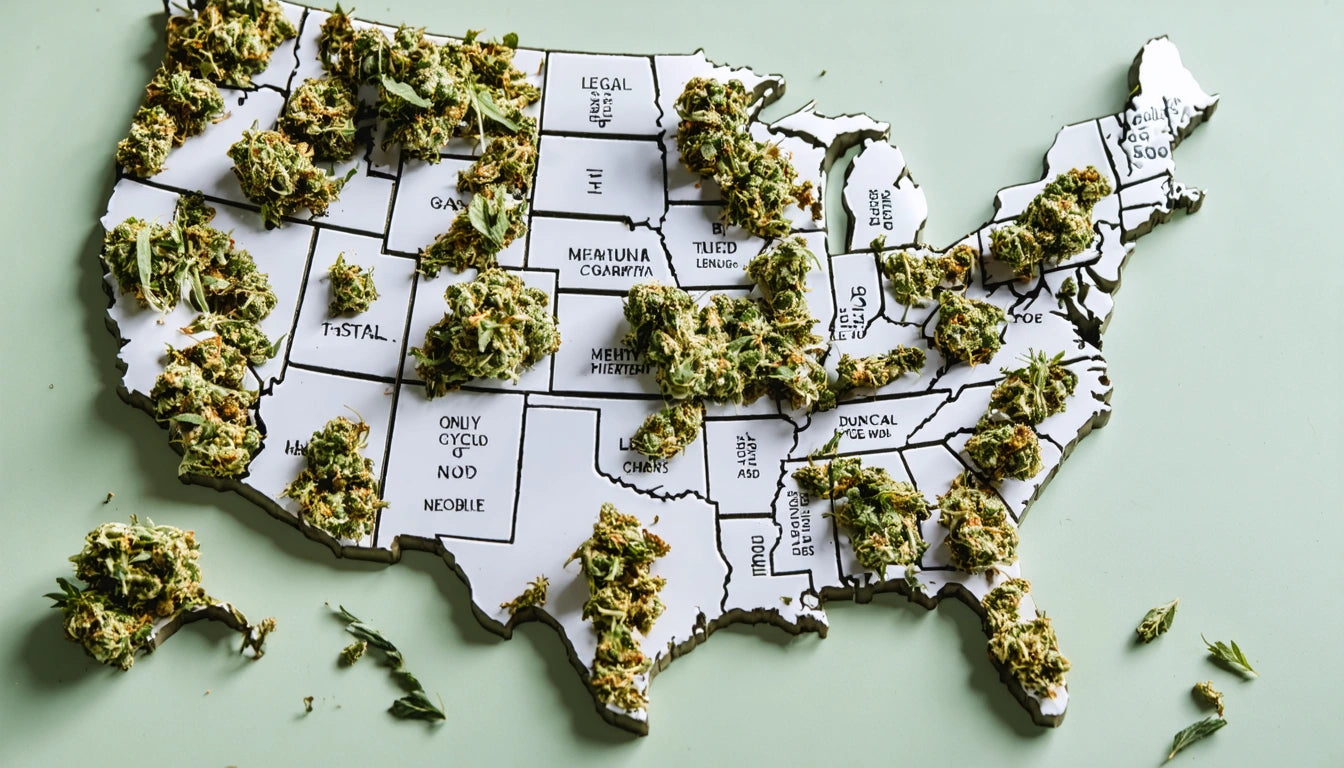Table of Contents
Comprehensive Guide to U.S. States Where Weed Is Legal and Illegal
The cannabis legalization landscape in the United States continues to evolve rapidly, creating a complex patchwork of laws that vary dramatically from state to state. Understanding where weed is legal, whether for recreational or medical use, is essential for consumers, businesses, and policymakers alike. This comprehensive guide provides an up-to-date overview of states where weed is legal in America and where it remains prohibited.
Recreational Cannabis Legal States
As of 2024, recreational cannabis is legal in 24 states plus Washington D.C. and several territories. These jurisdictions allow adults 21 and over to purchase and possess cannabis for personal use, though specific regulations vary by location.
Northeast and Mid-Atlantic
- Connecticut
- Maine
- Maryland
- Massachusetts
- New Jersey
- New York
- Rhode Island
- Vermont
Midwest
- Illinois
- Michigan
- Minnesota
- Missouri
- Ohio
West
- Alaska
- Arizona
- California
- Colorado
- Montana
- Nevada
- New Mexico
- Oregon
- Washington
Other
- Virginia
- Washington D.C.
- Guam
- Northern Mariana Islands
In these states where recreational weed is legal, adults can typically purchase products from licensed dispensaries. However, possession limits, home cultivation rights, and public consumption laws vary significantly. For example, while most states allow possession of 1-2 ounces, some are more restrictive while others permit larger amounts.
Medical-Only Cannabis States
Beyond the states where weed is legal for recreational use, an additional 14 states have legalized cannabis exclusively for medical purposes. These states require patients to have qualifying conditions and valid medical marijuana cards to purchase and possess cannabis legally.
- Alabama
- Arkansas
- Delaware
- Florida
- Hawaii
- Louisiana
- Mississippi
- New Hampshire
- North Dakota
- Oklahoma
- Pennsylvania
- South Dakota
- Utah
- West Virginia
The qualifying conditions and program administration in these states where medicinal weed is legal vary considerably. Some states have robust programs with dozens of qualifying conditions, while others maintain more restrictive approaches with limited qualifying conditions and stricter oversight.
As the legal status of cannabis continues to evolve, many of these medical-only states are considering expanding to adult-use programs through legislative or ballot initiatives.
States Where Cannabis Remains Illegal
Despite the growing trend toward legalization, cannabis remains completely illegal in 12 states. In these states where weed is illegal, possession can result in criminal penalties ranging from misdemeanors to felonies depending on the amount and circumstances.
- Georgia
- Idaho
- Indiana
- Iowa
- Kansas
- Kentucky
- Nebraska
- North Carolina
- South Carolina
- Tennessee
- Texas
- Wyoming
Some of these states have extremely limited CBD or low-THC programs that don't constitute comprehensive medical cannabis programs. For example, Georgia allows low-THC oil for certain medical conditions but has no dispensary system, making it effectively impossible for patients to legally obtain products.
For businesses operating across state lines, this complex legal landscape requires careful attention to packaging and compliance requirements that vary by jurisdiction, particularly for child-resistant packaging solutions that meet each state's specific regulations.
Recent Changes in State Cannabis Laws
The map of states where weed is legal for recreational use continues to expand. Recent additions include:
- Ohio: Legalized through a ballot initiative in November 2023
- Delaware: Legalized through legislation in April 2023, with sales expected to begin in 2025
- Minnesota: Legalized through legislation in May 2023
- Maryland: Began legal sales in July 2023 after voter approval in 2022
Several additional states have pending legislation or ballot initiatives that could further expand the list of states where weed is legal in America. Upcoming legalization efforts are particularly active in Pennsylvania, Florida, and North Dakota.
Compliance Requirements Across Legal States
For cannabis businesses, navigating the varying compliance requirements across states where recreational weed is legal presents significant challenges. Key differences include:
Packaging and Labeling
All states where weed is legal require child-resistant packaging, but specific requirements vary. Some states mandate opaque packaging, while others require transparent sections. Warning labels, THC symbols, and required information also differ between jurisdictions.
Testing Standards
Testing requirements for contaminants, potency, and other factors vary widely across states where weed is legal recreationally. Some states have more stringent heavy metal and pesticide testing than others.
Advertising Restrictions
Marketing limitations differ significantly, with some states imposing strict restrictions on advertising content, placement, and audience targeting.
As recreational markets mature, many states are refining their regulatory frameworks to address emerging concerns and industry feedback.
Future Legalization Outlook Across America
The trend toward cannabis legalization continues to gain momentum across the United States. Several factors are influencing this ongoing shift:
- Public Opinion: Support for legalization has reached historic highs, with approximately 70% of Americans supporting legal cannabis.
- Economic Benefits: Tax revenue and job creation from legal markets are providing compelling economic arguments for states considering legalization.
- Federal Reform Efforts: While cannabis remains federally illegal, various reform proposals could dramatically change the national landscape.
Experts predict that within the next five years, the majority of U.S. states will have legalized cannabis for adult use. This expansion will likely include several of the current medical-only states and potentially some states where weed is currently illegal.
For businesses and consumers navigating this evolving landscape, staying informed about which states have legalized weed and understanding the specific regulations in each market will remain essential as the industry continues to mature and expand across America.











Leave a comment
All comments are moderated before being published.
This site is protected by hCaptcha and the hCaptcha Privacy Policy and Terms of Service apply.